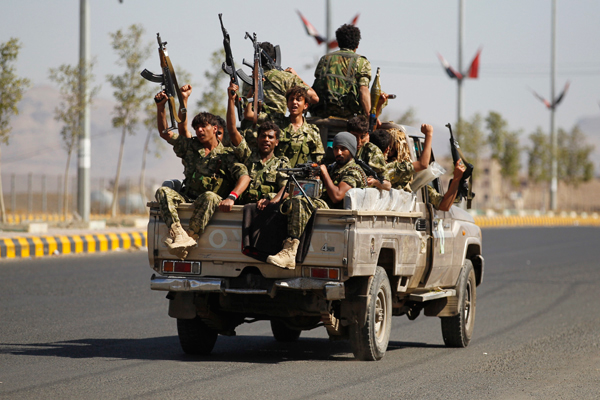
What is happening in Yemen, can peace talks succeed?
LONDON, March 25, 2016
A year after the conflict in Yemen spread across the country, nearly half its 22 provinces are on the verge of famine and most of the population need some form of aid, according to the United Nations.
Yemen was already mired in a humanitarian crisis before the violence escalated in March last year, but now its needs are beyond the international aid agencies' current capacity to respond, the United Nations has said.
The warring parties have agreed to a cessation of hostilities starting at midnight on April 10 and peace talks in Kuwait beginning a week later, the United Nations said on Wednesday.
There have already been several failed attempts to defuse the conflict, which has drawn in regional foes Saudi Arabia and Iran.
What's happening in Yemen?
President Ali Abdullah Saleh was forced to step down in 2011 after widespread protests against his 33-year rule.
A lengthy national dialogue ending in January 2014 failed to generate consensus on power-sharing arrangements and the future of the south.
The Houthis, rebels who hail from northern Yemen where they have fought the government on and off for more than a decade, marched south in 2014, and by the end of the year had become the dominant authority in nearly half the country's governorates.
They tightened their grip on the capital in January 2015 after rejecting a draft constitution proposed by the government.
The Houthis formed an alliance with Saleh, their former foe, but it remains shaky. They now control the capital Sanaa and other major cities in central Yemen.
President Abd-Rabbu Mansour Hadi fled to Riyadh in March 2015, where he set up a government in exile. That month a Saudi-led coalition began a military campaign to support him and prevent the Houthis and forces loyal to Saleh from taking control of the whole country.
The internationally recognised government which the Houthis are fighting is now largely confined to the southern city of Aden.
Both the Houthis and the Saudi-led coalition have targeted civilians and some of the attacks may have been crimes against humanity, UN sanctions monitors said earlier this year.
Saudi Arabia has long accused its arch foe Iran of trying to expand its influence in Yemen by helping the Houthis.
What's happening in the south?
Meanwhile separatists, alarmed at the growing chaos in northern Yemen, have intensified calls for greater autonomy or an independent state for the south.
The separatists want to revive a southern socialist state that Saleh united with the north in 1990. They initially joined the anti-Saleh protesters in 2011, but the two sides later moved apart.
Yemen's unity was troubled from the start and resulted in a short but bloody civil war in 1994, won by the north. After that many southerners viewed the north as an occupying force.
Yemen has also been affected by a nascent Islamic State movement and al Qaeda-linked militants.
Al Qaeda in the Arabian Peninsula has expanded its foothold in the country as the government focuses on its battle with the Houthi rebels.
The United States carries out air strikes against the Islamist militants.
What is the humanitarian situation now?
Yemen is the poorest country in the Arab peninsula; it has to import almost all its food, but the conflict has slowed shipments to a trickle.
The nation's infrastructure is badly damaged, and many health centres and schools have been forced to close. - Reuters







